Angela Merkel's incredible rise from quantum chemist to the world's most powerful woman
Angela Kasner was born in Hamburg, West Germany, on July 17, 1954.

A perfectionist by nature, she excelled in her studies.
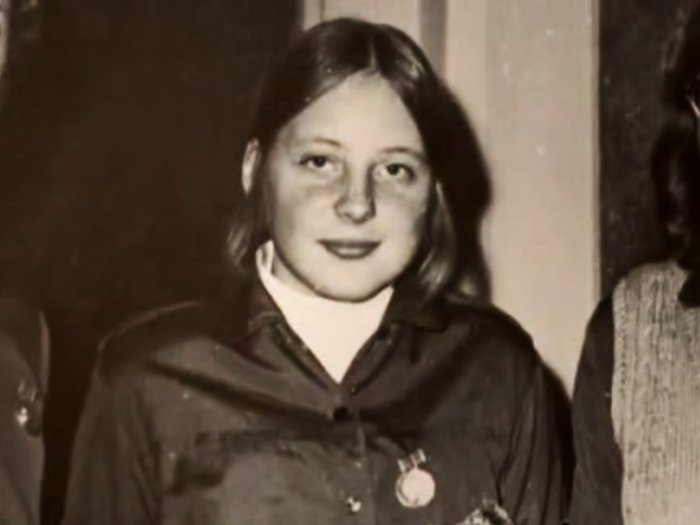
She excelled in academics, especially math, science, and languages.
In her teenage years, her parents encouraged her to join the Communist youth organization, the Freie Deutsche Jugend, or Free German Youth, to develop skills for a career in politics.
After flunking a physics course in high school, she decided to pursue a degree from the University of Leipzig in physics to prove her mastery of the subject.
Source: The Making of Merkel, BBC
She became a physicist.
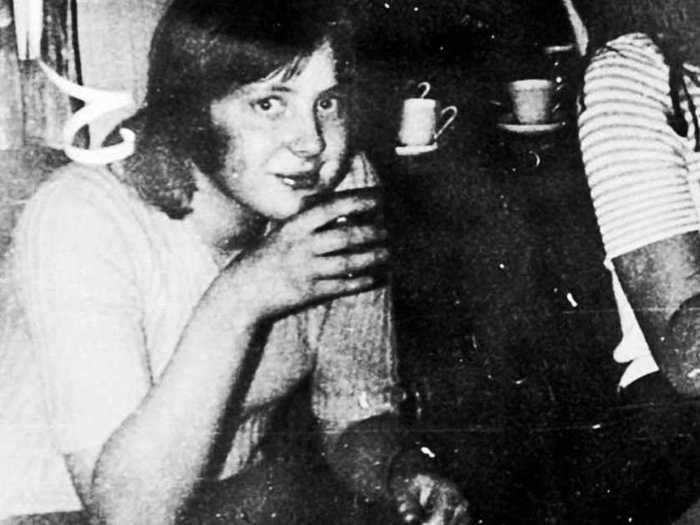
Popular among her peers, she caught the eye of fellow physics student Ulrich Merkel, whom she met during a Russian exchange trip.
She married him in 1977 and graduated the following year with a degree in physics and physical chemistry.
She continued her academic career and went on to study at the elite German Academy of Sciences, in Berlin, and earned a Ph.D. in quantum chemistry, in 1986.
Source: The Making of Merkel, BBC
She used her promising career in science to hide from the oppressive East German regime.
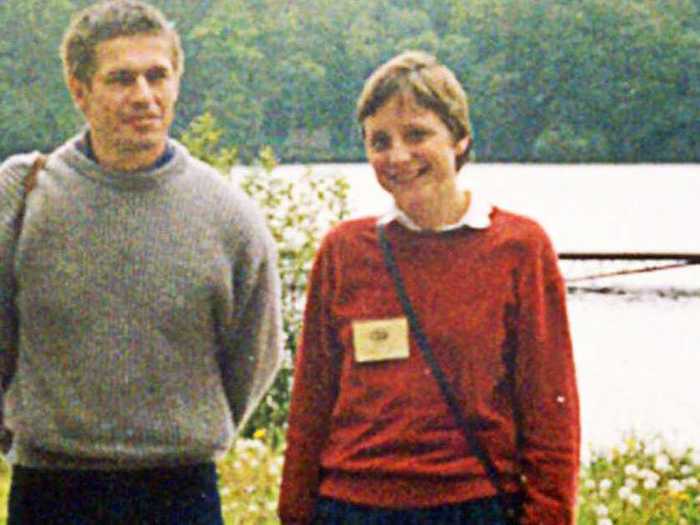
After earning her doctorate, she worked as a chemist at the Academy of Sciences, where she was one of a few female researchers.
She was convinced that a career in science would protect her from the constraints of the East German regime.
Merkel and her husband divorced in 1982. She later married Joachim Sauer, a chemistry professor.
She has always valued routine and consistency.

On November 9, 1989, the night the Berlin Wall fell, Merkel went to a sauna and then out for beers as she did every Thursday night.
Her decision to stick to her typical routine is an example of her stark contrast to the way most people in Berlin reacted that night.
Source: The Making of Merkel, BBC
Her first job in politics was unpacking boxes.
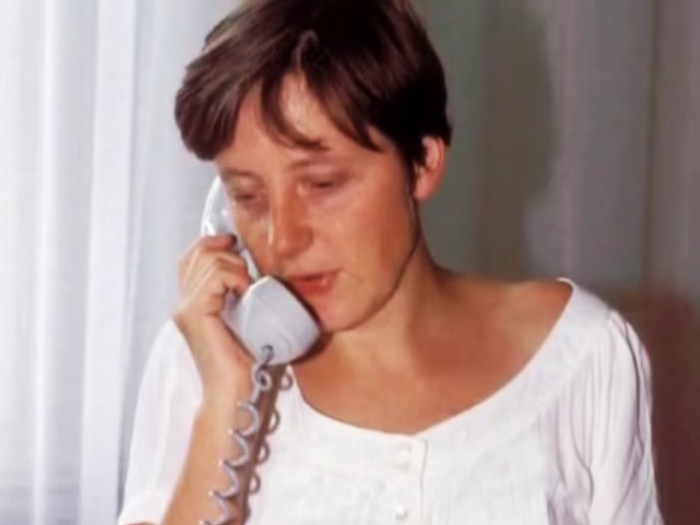
In 1989, Merkel made a move toward a career in politics and joined the center-right activists of the Democratic Awakening party.
Her first job was unpacking boxes of new computers and setting them up for the office.
A year later, she became the party's spokeswoman, and renamed the party the Allianz für Deutschland, or Alliance for Germany.
Source: The Making of Merkel, BBC
She was a rarity in the political world.
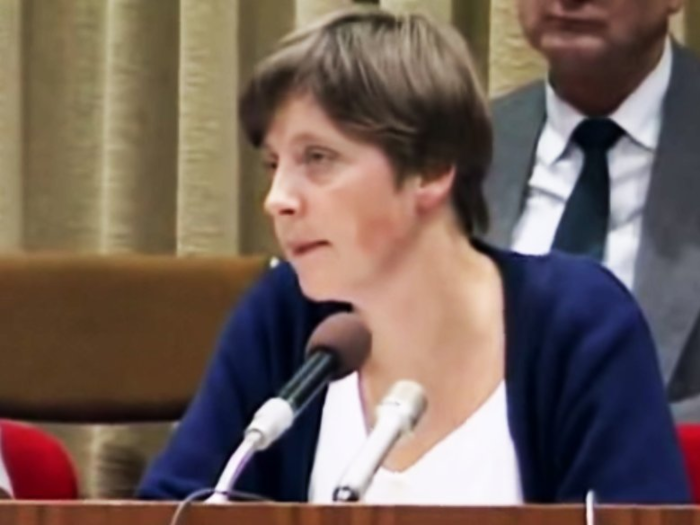
As a female with a doctorate in quantum chemistry, Merkel immediately stood out in the political realm.
Even in her new, more visible role as a spokeswoman, she kept her cropped haircut, baggy skirts, and sandals — and was criticized for it.
Her male counterparts were so distracted by her appearance they offered to pay for new and more suitable clothes for her.
Source: The Making of Merkel, BBC
She excelled at her political appointments.
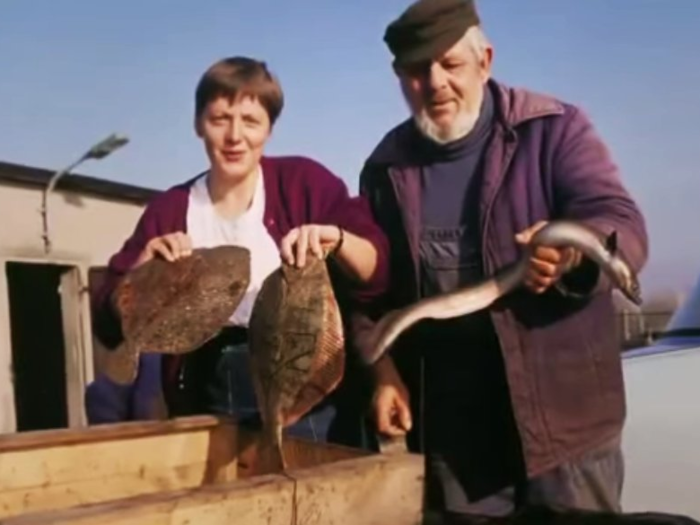
Merkel's rise to the top accelerated when she joined the largest party in West Germany, Christlich Demokratische Union.
She was selected for multiple positions by Helmet Kohl, her mentor and the leader of the Christian Democratic Union, or CDU.
He appointed her as minister for women and, a few years later, as minister of the environment, where she oversaw controversial topics like nuclear safety.
Source: The Making of Merkel, BBC
She took down the leader of her party by writing a fiery op-ed ...
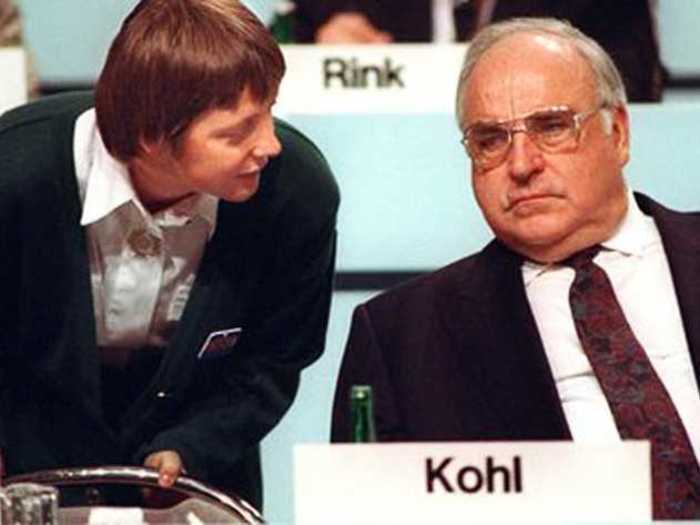
Kohl called her his "Maedchen," or little girl, up until she publicly called for his resignation in 1999 after he was caught rewarding party funds to his friends.
"One of the things people don't always understand about her is she's actually a ruthless political operator," former chief of staff to the UK Prime Minister Jonathan Powell told the BBC. "The way she dealt with all of her rivals in the CDU was extraordinarily Machiavellian. She would get rid of them in a twitch of an eyebrow."
Source: The Making of Merkel, BBC
And then she made history.
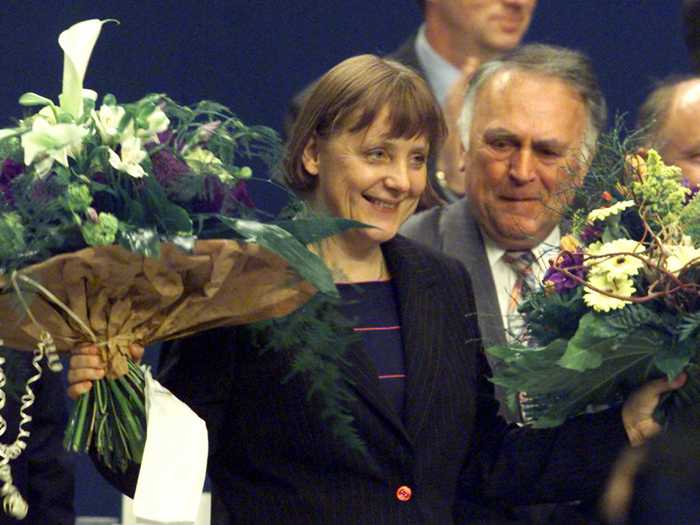
Four years later, she was elected as the new chairman of the CDU, making her the first woman to lead a major German political party.
She began her campaign against the ruling Social Democrats leader, Gerhard Schröder.
Source: The Making of Merkel, BBC
She became popular with voters for her classiness.
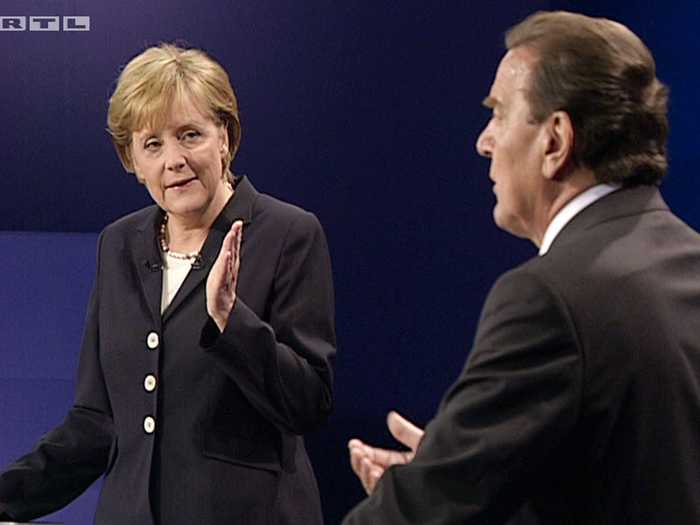
During a live television presidential debate, Schröder yelled at her across the stage, saying she should acknowledge that she was a "clear loser."
She took the opportunity to calmly respond, a strategy she continues to use to undermine her opponents. Voters began to see her as an even-mannered and classy candidate.
She became chancellor shortly thereafter.
Source: The Making of Merkel, BBC
She brokered a massive bailout for 19 nations.
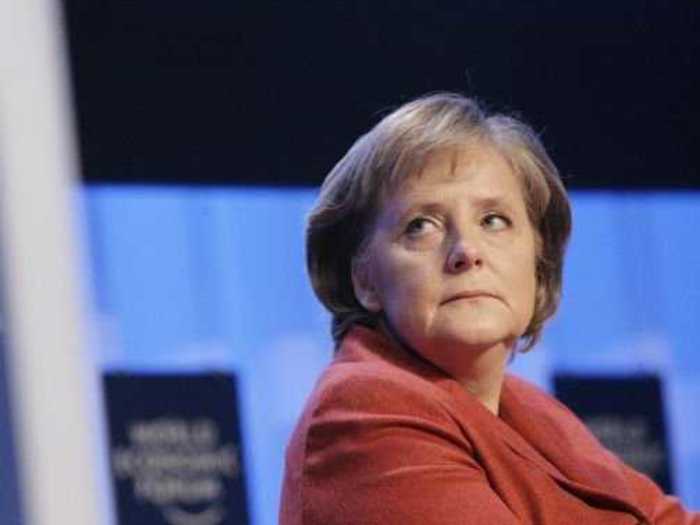
Merkel's most defining moments stem from her central role in managing the eurozone financial crisis.
After other European nations began to reveal that they too had unmanageable debt, Merkel analyzed all possible options before agreeing to a massive bailout.
She was criticized for her slow-moving approach and rigid viewpoints.
Source: The Making of Merkel, BBC
She uses a scientific approach in politics.
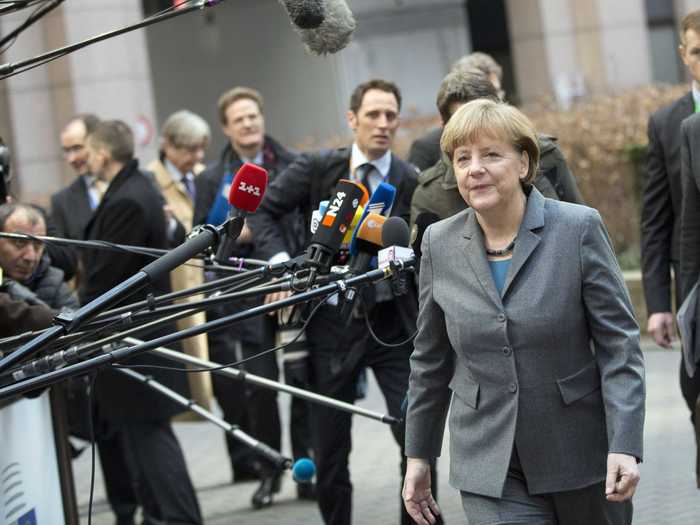
"People often accuse me of not acting fast enough. That I let things go on too long. For me it's important I deliberate all options ... running through scenarios, and not simply theoretical experiments in my head.
"But I also try to live with that decision for a while. I think about it for a whole day, to see how it develops. What it will mean, what people are going to say about it, who's going to write something about it, who's going to criticize it," Angela Merkel.
Source: The Making of Merkel, BBC
She doesn't flinch at the machismo of her counterparts.
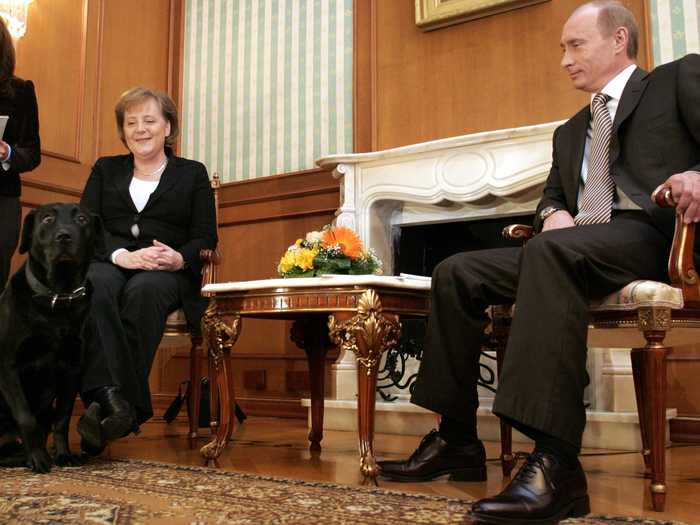
On her first trip as chancellor to the Kremlin, Russian President Vladimir Putin gave her a plush toy dog as a gift after learning she was attacked by a dog in the mid-'90s.
At their next meeting, he asked for his black dog, Kony, to be brought into the room. Putin allowed the dog to run around while he sat with his legs widely stretched and a grin on his face. Merkel kept a poker face in front of Putin and later described his behavior as "weakness."
"He's afraid of his own weakness. Russia has nothing, no successful politics or economy. All they have is this," she reportedly told a group of reporters. Ironically, Putin's aggressive actions in Ukraine corroborate this point.
Source: The Guardian, Bild.de, and The New Yorker
She is adored by her World Cup winning soccer team.
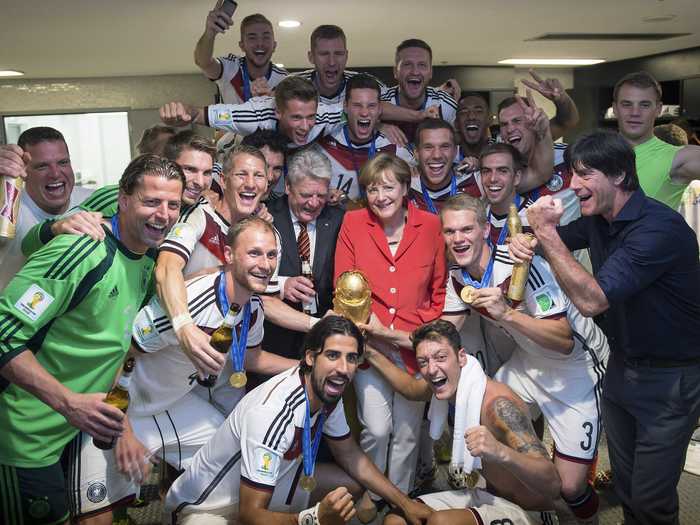
Merkel is credited for being the first chancellor to appreciate and support sports in her nation. The team declared her as the official mascot for the squad and calls her Muttivation, a play on her nickname, Mutti, meaning mommy.
"The chancellor's visit to the German team during the World Cup shows that she takes people and their interests seriously," said market researcher Manfred Güllner of the Forsa Institute.
Source: The Guardian
Angela Merkel is the world's most powerful woman ...
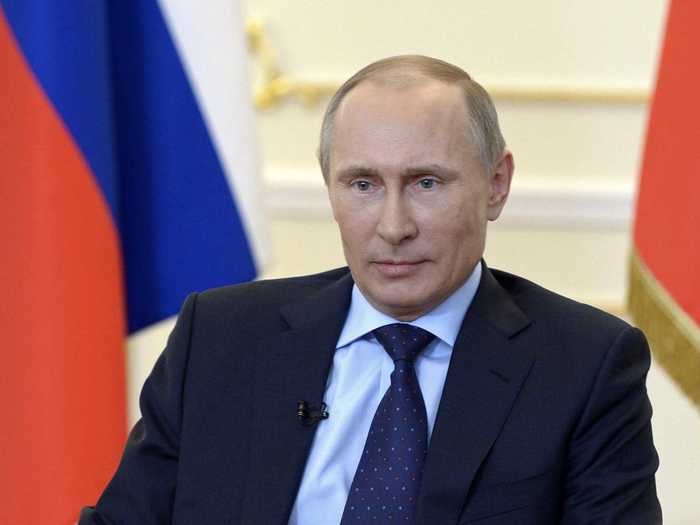
... Now meet her male counterpart in Russia.
Putin's extraordinary path from Soviet slums to the leader of Russia »
Popular Right Now
Advertisement